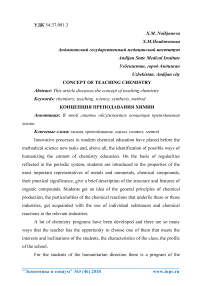Concept of teaching chemistry
Автор: Noibjonova X.M.
Журнал: Экономика и социум @ekonomika-socium
Статья в выпуске: 3 (46), 2018 года.
Бесплатный доступ
This article discusses the concept of teaching chemistry
Chemistry, teaching, science, synthesis, method
Короткий адрес: https://sciup.org/140236369
IDR: 140236369
Текст научной статьи Concept of teaching chemistry
Innovative processes in modern chemical education have placed before the methodical science new tasks and, above all, the identification of possible ways of humanizing the content of chemistry education. On the basis of regularities reflected in the periodic system, students are introduced to the properties of the most important representatives of metals and nonmetals, chemical compounds, their practical significance, give a brief description of the structure and features of organic compounds. Students get an idea of the general principles of chemical production, the particularities of the chemical reactions that underlie these or those industries, get acquainted with the use of individual substances and chemical reactions in the relevant industries.
A lot of chemistry programs have been developed and there are so many ways that the teacher has the opportunity to choose one of them that meets the interests and inclinations of the students, the characteristics of the class, the profile of the school.
For the students of the humanitarian direction there is a program of the academic subject "Chemistry" IM. Titovoy. In the explanatory note, the author indicates the ideas on which the construction of the program of the training course is based:
. The need to include the subject in the curriculum of classes of the humanitarian profile is determined by the specifics of his contribution to the development of the student's personality.
. The content of the program focuses on strengthening the connection of students studied with life, experience and knowledge, active use of intersubject communications.
. During the construction of the program, a number of important sections of the chemistry course of the general education school were preserved.
. Accounting for students' humanitarian inclinations, as well as the orientation of the course to maximize the use of the developing potential of the academic subject.
In a variety of concepts and curricula, it is possible to single out general provisions that unite different approaches to chemistry teaching.
First, the selection of the content of chemistry education takes into account the interests and needs of all participants in the educational process, and first of all the student as a free, self-determined person. All authors strive to ensure that the content of the training was full, students would comprehend the foundations of a universal culture taking into account national and regional characteristics and traditions.
Secondly, as a result of the change in the target orientation of chemical education, the developmental function of learning becomes a priority. The teaching of chemistry aimed at developing the personality of the schoolchild and mastering the basics of the most important chemical knowledge and methods with substances and chemical equipment will promote the development of intellect and increase the level of chemical preparedness of members of society, creates prerequisites for the full use of chemistry in the sphere of economy, culture, life , environmental protection.
Thirdly, the main common methodological approaches to chemistry education are the strengthening of applied, practical and environmental orientation, the prevention of abstract perception of educational material, the revitalization of a chemical experiment, the use of computer technology.
At the same time, the implementation of approaches described in existing concepts will ultimately lead to the destruction of a single educational space due to a significant change in the content of chemistry education in different profiles. If we approach the teaching of chemistry at the basic level in the upper grades from the point of view of not changing the mandatory minimum of the Federal component, but its additions in the context of one or another profile, i.e. the inclusion of additional elements of knowledge and skills, mastered by students in the study of profile courses, while preserving the content core, it will be possible to increase the motivation of schoolchildren to learn chemical knowledge and, consequently, to increase the effectiveness of the learning process.
Consider from the point of view of the use of professionally oriented interests of students the content (teaching content) and procedural (teaching methods) aspects of teaching chemistry at the basic level in profile classes.
The content of education is determined, first of all, by the goals that education faces as a whole, i.e. not only before the training, but also before the upbringing and development of the students. In the first approximation, these goals can be divided into two large groups:
external, i.e. goals that are assigned to the learner;
internal, i.e. goals that are delivered to students.
External goals are formed on three levels: personal (individual), public and state. Studying and systematization of individual, public and state needs in the general education of citizens allowed to distinguish the following groups and subgroups of needs:
Individual needs of the individual (family) in the field of general education as a potential for personal, social and professional success of trainees. This group includes personal success, social success and professional success.
By personal success understand a full and diverse personal formation and development, taking into account individual inclinations, interests, motives and abilities.
Список литературы Concept of teaching chemistry
- Браун Т., Лемей Т.Ю. Химия -в центре наук. -Т. 1,2. -М.: Мир. 1983
- Горелов А.А. Концепции современного естествознания. -М.: Центр, 2002.
- Карпенков С.Х. Концепции современного естествознания. Учебник. -М.: ЮНИТИ, 1997.


